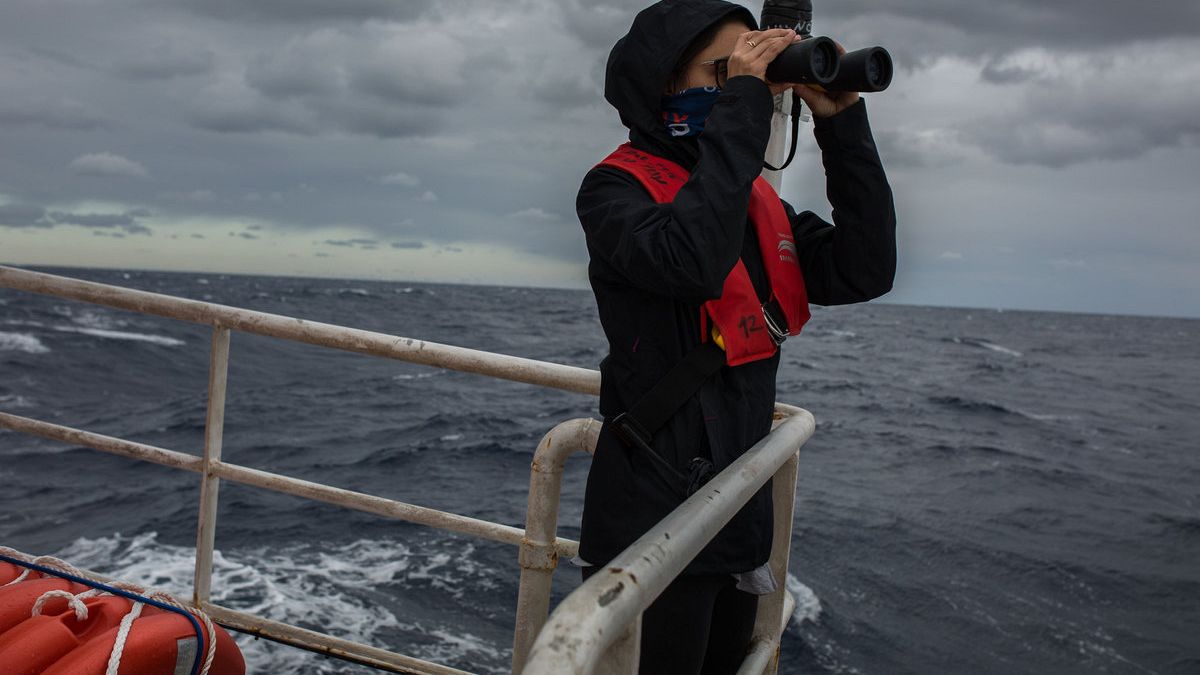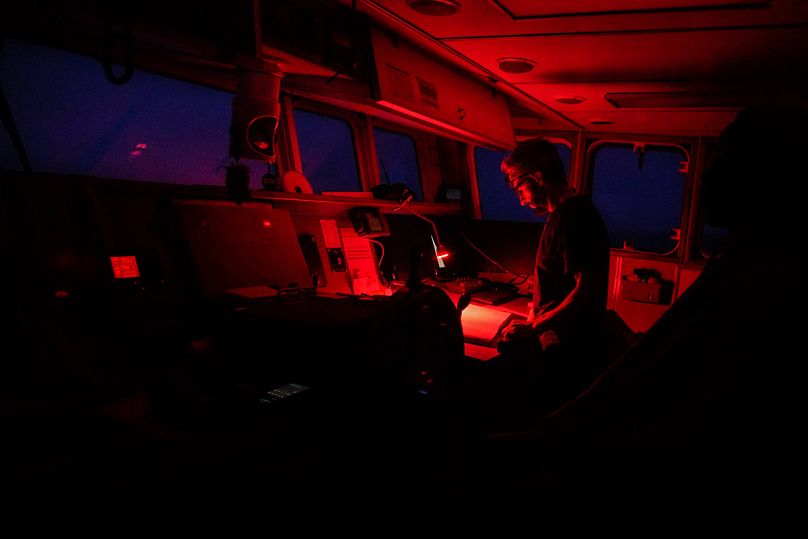The NGO faces a fine of up to €901,000.
On 12 November, a former fishing vessel operated by Spanish NGO Salvamento Marítimo Humanitario left the port of Mitilini, Lesbos, in Greece.
It had been stranded for almost a year after transporting more than eight tonnes of humanitarian aid from Guipúzcoa, in northern Spain, to the Greek island.
It is now in central Mediterranean waters, working in coordination with the Maltese authorities in the search and rescue area assigned to the country.
"If we come across a boat, we will inform the authorities and make ourselves available to them. And if they see a boat close to our boat, they will give us instructions to operate," Iñigo Mijangos, president of SMH, explained to Euronews, from the ship.
"If they (the boat) are in the Libyan SAR zone, and cannot be held responsible, they will warn Malta and they will warn us," he added.
Defiance
Just like the Open Arms ship, which is owned by another Spanish NGO, the Aita Mari has defied a ban on search and rescue vessels operating in the central Mediterranean, despite threats of a lifetime ban for the captain and a fine of up to €901,000.
But Mijangos is confident that, as they work in coordination with the Maltese authorities, the sanctions won't be levied.
"What the government wants with the threat of a fine is not to deal with the circumstance that we have a lot of people on board without a port of disembarkation," he said.
He argues that Spain is aware that the Aita Mari is a rescue ship with limited ability to carry people, and as long as the Maltese authorities provide a disembarkation port, the sanctions will not apply.
It is not just Spain that has tussled with seach and rescue boats in the Mediterranean. Earlier this year, the Dutch-flagged Sea Watch's German captain, Carola Rackete, was arrested after flouting an Italian ban to dock in Lampedusa.
Although Dutch parliamentarians backed the NGO, the government provided little support.
'It's a tragedy'
On the Aita Mari's bridge, captain Marco Martinez checked the weather for the next few hours while medical volunteer Josu Beitia, a retiree, surveyed the horizon towards Libya with binoculars, looking for a small spot in the middle of the sea.
On the bow, the two smaller rescue ships and the crane that releasees them were uncovered, ready to be dispatched quickly if needed. On the stern, four centifloats were ready to be inflated.
The weather report confirmed a southerly wind, which could have increased the number of boats setting sail from the Libyan coast. But the waves - which were of more than two metres - did not bode well for any boat that did to cross the 200 miles to Malta or Lampedusa.
"With these waves, any rubber boat like the ones they use ends up sinking. It doesn't stand a chance," Martínez said.
On Saturday 16 November, Ocean Viking, another rescue boat operating in the area, found a large rubber boat practically sunk 30 miles off the Libyan coast. Rescuers typically mark boats that are rescued before releasing them, but this vessel had no such marking.
"The boats are full of people and with these temperatures, they deflate at night, causing one person to fall into the water, grabbing the person in front of them and making them fall in as well," Martínez, who spent a year on the Open Arms, explained.
"But the boat continues its course, it doesn't stop. It's a tragedy."
He said that the Aita Mari once rescued a woman with three children who wouldn't stop crying.
"We found out that her husband had fallen into the water hours before we found them. You are the one who makes the search patterns and you think, that if you had done it in another way, maybe we would have found them before... You have to learn how to manage all this on the way back. Either you do it, or you can't go on with your life in a normal way," Martinez said.
1,091 deaths
As night fell over the Mediterranean, one shift ended and another started. The crew must remain on constant alert if a signal is given, either on the radar or by radio.
"This situation of the humanitarian crisis in the Mediterranean is produced by the will of the European Union to create a black space, without rights in the SAR Libya zone. They do not have the capacity to respond to calls for help. The European Union has provided them with boats and training to justify themselves. In this way they normalise 'summary deportations'", Mijangos argued.
"If in this SAR zone there were a shipwreck of a yacht of European citizens, the Libyans would never be in charge of taking care of that boat. The EU would not be so scrupulous in asserting that Libya is responsible. But they are migrants, that is the reality. The point is to justify a 'summary deportation'," he continued.
And the boats cannot find everyone.
As of November 18, 1,091 migrants have lost their lives attempting to the Mediterranean so far this year, and this figure only counts the bodies recovered.

